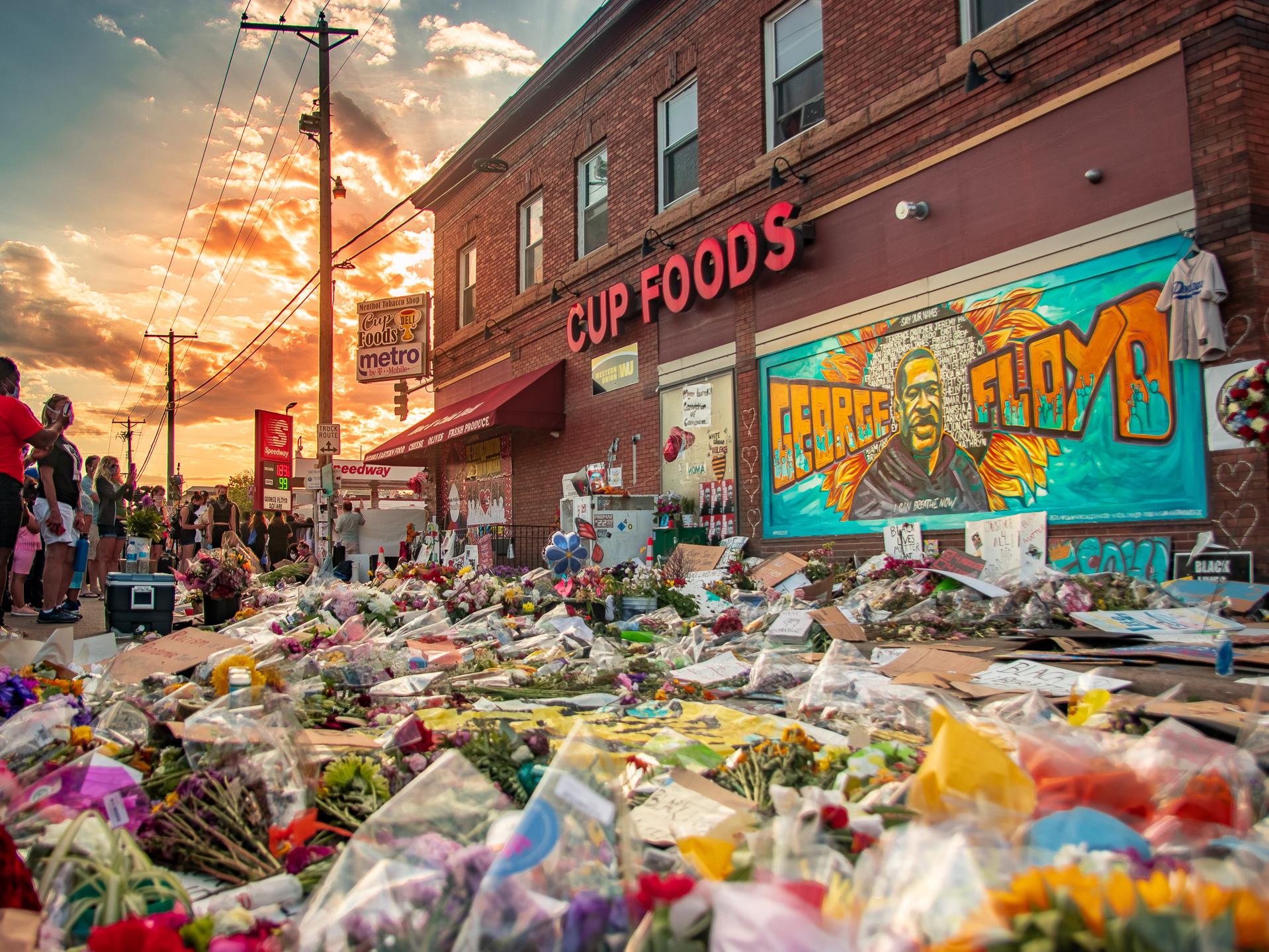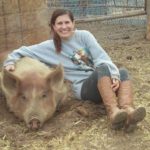| The original English version of this essay can be found here. |
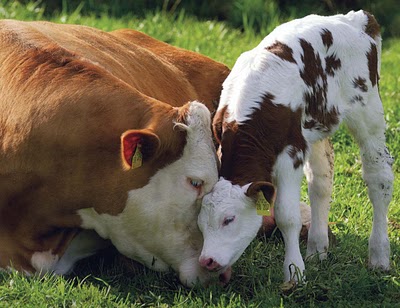
Por Syl
Me quedé más que decepcionada después de leer el reciente post de Olivia (de Skepchick) y la discusión que le siguió en la sección de veganismo. Primero que todo, no hubo en absoluto una conversación sobre las conexiones entre el ateísmo y el veganismo. Siempre me parece una pérdida completa de tiempo tratar de explicar la falta de interés en el veganismo en espacios ateos. Los ateos parecen ser suficientemente críticos siempre y cuando ellos permanezcan en la pequeñez de la conversación relacionada con la creencia de que el veganismo es una acción basada en la acción ética del individuo, en lugar de una posición propia de justicia social y un movimiento fundado en ciertas creencias éticas. Algunas de las características clave de esta construcción miope del veganismo son:
(a) Fundamentalmente, el veganismo es un asunto ético fundado en el individuo.
(b) El veganismo es un ideal inalcanzable. Es una guía en lugar de una meta realizable.
(c) El veganismo es una práctica relacionada con la alimentación, una ética de alimentación, y/o una dieta.
(d) El veganismo consiste en intentar hacer “lo mejor que se pueda”.
(e) Naturalmente, el veganismo conlleva momentos de “culpa” porque uno no puede ser un “vegano perfecto”.
(f) El veganismo es una práctica aislada conceptualmente de otras prácticas de justicia social.
En su post, Olivia se refiere consistentemente al veganismo como “ética de la alimentación” o una “dieta” (c) y resto de (a) a través (f) se puede ver en solo un pasaje:
Podemos ver que no todas las conclusiones éticas abstractas demandan una perfecta conformidad, porque nuestro propio bienestar debería ser parte de nuestros cálculos éticos. Cada uno de nosotros tiene una cantidad limitada de tiempo, dinero, y energía, y tenemos que decidir en cuáles áreas vamos a concentrar esos recursos. Hay una sorprendente cantidad de cosas que podemos hacer para mejorarnos a nosotros mismos y a nuestras comunidades, y simplemente no podemos cumplir con todas. Si cambiar nuestra dieta agota nuestros recursos profundamente, nos puede lastimar, o dejarnos ansiosos, enojados, infelices, e incapaces de actuar éticamente hacia las personas que están a nuestro alrededor (como un ejemplo, yo sé que soy una perra irritable cuando no consumo suficiente proteína). Si una preferencia ética en particular nos deja sin más energía o recursos, puede que no sea la manera más efectiva para mejorar el mundo.
Déjenme referirme de (a) hasta (f).
(a) El veganismo, fundamentalmente, es una posición de justicia social basada en el colectivo político. Esto significa que la explotación en masa y la tortura de los animales solo puede ser erradicada con la reestructuración política y social. Demandamos reestructuración política y social para también dirigirnos a las situaciones de otros grupos oprimidos… porque ser anti-racistas, anti-sexistas, anti-homofóbicos, etc., es tomar una posición de justicia social. Estas no son posturas éticas del individuo (aunque ellas son fundadas en preocupaciones éticas e implicaciones éticas le siguen). No hay charla sobre “y tú!” (“do you!”) cuando se trata de posturas de justicia social, porque adoptar una postura de justicia social es hacer cierto reclamo sobre tus propios derechos. Los derechos son un concepto universal, no un concepto de “y tú!”.
El veganismo no es solo una postura de justicia social sino que también se basa en una postura crítica. Es una postura fundada por la crítica de nuestra heredada narrativa de consumo con respecto a los animales. Tomamos la cuestión con la suposición de que los animales deben pertenecer a nuestra narrativa de consumo y nosotros mantenemos que es en parte por esta fallada suposición de que los animales deben permanecer sin derechos. Si los animales simplemente son seres para que nosotros consumamos y usemos, ya sea como alimento, vestimenta, entretenimiento, sujetos de investigación, etc., entonces es contradictorio también mantener que ellos son seres que merecen ser protegidos de los abusos. Mientras asumamos que los animales pertenecen a la narrativa de consumo, a ellos nunca se les concederán derechos. (Les remito a mi post anterior).
(b) Alcanzar metas veganas es sin duda un proyecto que se puede realizar. El único obstáculo en el camino para ver esto es la tendencia a reconstruir el veganismo como un proyecto basado en la ética del individuo! Obviamente, los esfuerzos éticos hechos por individuos aislados no podrían desmantelar el mito sobre el papel de los animales en la narrativa de consumo actual. La narrativa de consumo es una historia sistémica completa con fuerzas económicas, culturales y políticas; entonces, si vamos a encontrar una buena estrategia para embestir el problema, va a tener que ser a un nivel sistémico. La abolición de la esclavitud no fue simplemente la suma de proyectos basados en la ética del individuo. Más bien, fue el resultado de llamadas hacia la reestructuración social y política. Ciertamente, la abolición pudo haber sido un ideal inalcanzable si los abolicionistas no hubieran conseguido ver que la raíz de esta tradición opresiva estaba basada en una narrativa sistémicamente sostenida. En otras palabras, nuestras grandes injusticias sociales no existen simplemente porque hay personas “malas” que no están dispuestas a luchar por ideales abstractos e irrealizables. Las grandes injusticias sociales existen porque hay estructuras construidas y mantenidas que funcionan para perpetuar esas mismas injusticias. Estas estructuras son lo mismo que alimenta la ilusión de que deshacernos a nosotros mismos de ciertas injusticias sociales son ideales “abstractos” desprovistos de realidad o simples fantasmas del optimismo que la naturaleza humana nunca puede acomodar.
(c) El veganismo no es una simple práctica alimenticia, o ética alimenticia, o una dieta. Esto no es para decir que las prácticas alimenticias no son asuntos de justicia social. Ciertamente lo son y merecen más atención. Sin embargo, el veganismo es una posición de justicia social con la meta de asegurar los derechos de los animales y, como tal, no se agota por lo que comemos o vestimos. Me disgusta hasta escuchar los términos “veganismo”, “prácticas alimenticias” y “éticas alimenticias” en la misma oración. Si, como hemos argumentado, los veganos propiamente llegan a la posición de justicia social criticando la suposición de que los animales deben pertenecer en la narrativa de consumo, entonces le sigue que los veganos no miren conceptualmente a los animales como comida. Llamar al veganismo “ética alimenticia”, o una “dieta”, o una “práctica alimenticia” es un perezoso nombre errado.
(d&e) El sentimiento de culpa solamente tiene sentido cuando se ve el veganismo de forma miope como un proyecto ético del individuo. Voy a tener que apoyar este argumento con un ejemplo. Una de mis películas favoritas por desgracia tiene una corta escena con una innecesaria estupidez misógina. Cuando la temida escena se acerca, yo -como una firme feminista- no me siento culpable. Más bien, me siento frustrada y –como mucho (y a lo peor)- impotente como un individuo. Como vegana, soy consciente de que en la actualidad no puedo vivir una vida libre de explotación animal. Como he mencionado anteriormente, nuestra sociedad ha sistematizado e institucionalizado la dependencia humana de animales y de la explotación y tortura animal. Cuando aprendo que las paredes en mi casa (muy probablemente) contienen productos de animales explotados, parece inapropiado sentir culpa. Yo no soy culpable en este caso. Más bien, me siento frustrada por lo penetrante que el problema es y –como mucho (y a lo peor)- impotente. El sentimiento de impotencia disminuye después de un rato y la frustración que queda me recuerda cuál es el lugar correcto para mi activismo: en el nivel sistémico. Sentimientos momentáneos de impotencia, que son naturalmente fundados en la impotencia individual, y la frustración, son emociones productivas porque indican que el problema trasciende al individuo. La culpa no es productiva porque indica que el problema deriva del individuo.
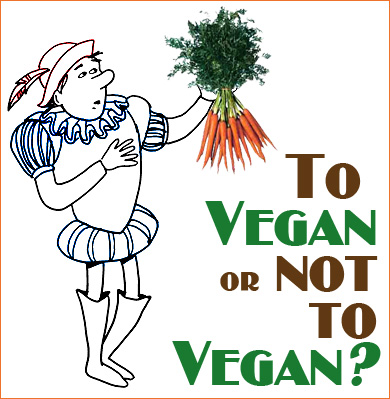
Algunos podrían objetar que yo he prestado poca o nada de atención al sentirme culpable cuando se trata de algún “desliz” o de ser “flexible” en cierta compañía, o de aquellos en ciertas situaciones quienes -independientemente de posiciones de justicia social- debemos depender de los animales para alimento y vestido. Con respecto a lo primero: como ya he manifestado, creo que el veganismo es debidamente entendido como una crítica a la narrativa de consumo y del lugar de los animales en ella, lo que significa que un vegano o vegana realmente cree que los animales son sujetos que merecen derechos. Creo que adoptando una posición crítica hace que los “deslices” o la “flexibilidad” sean imposibles. (Polémicamente), creo que los fenómenos de los “deslices” y la “flexibilidad” tienen mucho que ver con adoptar la posición ética del individuo, la cual se basa en nociones vagas de estatus morales y “crueldad” y no hace mucho para alterar conceptualmente o críticamente a la persona.
(De nuevo, polémicamente) no considero que situaciones que involucren dificultades extremas sean de preocupación inmediata para los veganos. Como veganos, debemos estar preocupados por la narrativa de consumo; estamos preocupados por la historia que nosotros como sociedad contamos sobre los animales y el lugar que ellos ocupan en nuestras rutinas de consumo. Cuando las personas usan animales para la supervivencia básica, ellos no están interesados en crear una narrativa de consumo en la cuál los animales son los perjudicados por algún privilegio percibido. Ellos no tienen el poder para institucionalizar estas nociones. Ellos simplemente están tratando de sobrevivir. El profesor Will Kymlicka se refiere a esta situación como una que reside fuera de las “circunstancias de justicias.” Este es un caso diferente a lo que debería preocupar a los veganos. (Similarmente, cuando rocías un insecto en tu cocina con un spray para cucarachas, consecuentemente matándolo, esta es una situación diferente de las que a los veganos les debería preocupar. Tales incidencias aisladas no tienen nada que ver con mantener la presente narrativa de consumo, de la misma manera que rociar la cara de un intruso con el mismo spray para cucarachas no tiene nada que ver con actuales violaciones a los derechos humanos.)
(e) El veganismo no es un asunto de justicia social aislado de otros asuntos de justicia social. Olivia declaraba anteriormente, “Cada uno de nosotros tiene una cantidad limitada de tiempo, dinero, y energía, y tenemos que decidir en qué temas enfocar nuestros recursos.” Tal punto de vista es rampante entre veganos y no-veganos. Conforme a esta mentalidad de “asunto-único” (“single-issue”), los activismos son estructurados para referirse a un asunto y se refieren a este asunto como siendo fundamentalmente independiente de y diferente de otros asuntos. Como resultado, tenemos que priorizar asuntos. El enfoque de asunto-único oscurece la realidad de cómo el racismo, sexismo, clasismo, discriminación en base a la diversidad funcional, homofobia, especismo, ecocidio, etc. no están solo conectados pero son dependientes el uno con el otro para formar lo que yo llamo un “holismo pernicioso”. Si uno ve esta realidad, el enfoque de el asunto-único parece complemente incoherente. Si todos estos asuntos contra los que luchamos están enredados en una profunda, interconectada red, entonces no tiene nada de sentido estructurar nuestro activismo como si ellos no estuvieran conectados o como si no fuesen interdependientes. Aislar un asunto de esta red es equivocarse sobre la raíz y profundidad del problema, por lo que cualquier activismo que siga de este aislamiento es fútil. La mayoría de las veces, los enfoques de asunto-único son desposados simplemente por la falta de diversidad. Puede ser difícil descubrir cómo ciertos asuntos en particular están conectados si no se tiene en cuenta con las experiencias relevantes.
Por ejemplo, históricamente, los movimientos feministas en su lucha se han centrado solamente en el aspecto de género, simplemente porque sus miembros y las mujeres a las que convirtieron en su objetivo y por las que hablaron fueron todas mujeres blancas de una clase en particular. Hasta hace poco, nunca se les había ocurrido a las organizaciones feministas convencionales que la raza y la clase sean fuerzas sociales que dan forma al género. Aunque a las organizaciones veganas les guste comparar entre las similitudes de la explotación humana y animal, raramente lo llevan al siguiente paso lógico, concluyendo que estas similitudes tienen algo que ver con la misma estructura que apuntala estas explotaciones. La anatomía de esta estructura en la cual todas las explotaciones giran es el holismo pernicioso que existe entre todos los -ismos regresivos. Entonces, adoptar un compromiso en el camino correcto hacia el veganismo, no significa quitar tiempo, dinero y energía de otros compromisos valiosos. Tener un compromiso con el veganismo es solo comprometerse en atacar la subyacente estructura del especismo, que está estructuralmente incrustada en todos los otros –ismos regresivos.
Como he mencionado en otro lugar, esto no es decir que el activismo vegano sea feminismo, sea activismo anti-racista, etc. Sin embargo, luchar contra la fuerza que le da forma a la explotación animal también requiere luchar contra las fuerzas sociales que le dan forma y se cruzan con tal fuerza. El género, la raza, la clase, las capacidades, la orientación sexual, etc. Este es el enfoque del asunto-múltiple o como a veces se le denomina “activismo interseccional”. Para una buena demostración de este enfoque, considera este punto que la Dra. Breeze Harper hace cuando ella argumenta que hay algo incoherente en llamar a los productos veganos “libres de crueldad” si han sido hechos por niños esclavos!
Conclusión. La moraleja de todo esto es que el ver el veganismo desde la perspectiva del individuo como una práctica que se agota a sí misma en tu ética personal es diametralmente opuesto al objetivo del veganismo, que es erradicar el mito de que los animales pertenecen a la narrativa del consumo. Puesto que las protecciones legales son las únicas cosas que podrían prevenir significativamente la explotación de seres vulnerables y puesto que el lenguaje de los derechos es el único lenguaje que puede asegurar la vulnerabilidad formal de los seres, nuestra tarea como veganos es asegurar los derechos de los animales si vamos a alcanzar nuestra meta. Las implicaciones éticas que siguen a este punto de vista son solo eso: ellas siguen la posición crítica que aumenta nuestra postura de justicia social y consecuentemente define nuestras prácticas. Necesitamos insistir que estamos involucrados primero y más que nada en el negocio de justicia social. El discurso de la moralidad meramente nos dice algo sobre nosotros– sobre nuestro carácter, sobre si nosotros somos buenos o malos. El discurso sobre los derechos nos dice algo sobre los animales– acerca de que merecen lo que aún no tienen.
Syl is a local activist and PhD student in philosophy in Chapel Hill, NC. She is currently working on her dissertation, which posits the “human” in the human/animal binary as a location of naturalized whiteness and in which she argues for an interpretation of the human/animal binary as racist. Syl also has secondary interests in black feminism, the history of philosophy and philosophy of animal death.


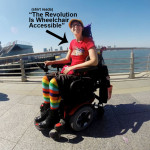 Michele Kaplan is a queer (read: bisexual), geek-proud, intersectional activist on wheels (read: motorized wheelchair), who tries to strike a balance between activism, creativity and self care, while trying to change the world.
Michele Kaplan is a queer (read: bisexual), geek-proud, intersectional activist on wheels (read: motorized wheelchair), who tries to strike a balance between activism, creativity and self care, while trying to change the world.

